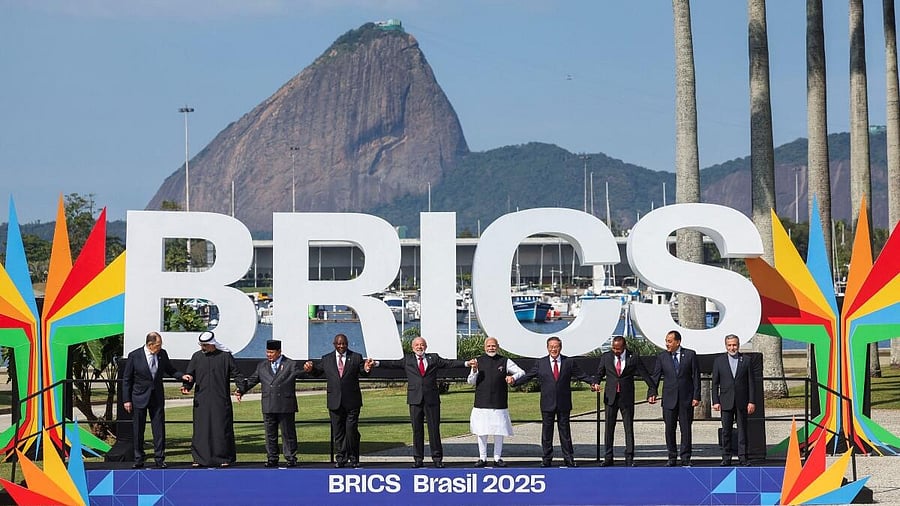
BRICS leaders pose for a photo during the BRICS Summit in Rio de Janeiro, Brazil July 6, 2025
Credit: Reuters Photo
New Delhi: India has signed the BRICS declaration that condemned the April 22 terrorist attack in Jammu and Kashmir, denounced cross-border terrorism, but avoided directly criticising Pakistan for promoting and exporting the menace.
The leaders of the BRICS adopted the “Rio de Janeiro Declaration” during the bloc’s 17th summit hosted by President Luiz Inácio Lula da Silva of Brazil.
“We condemn in the strongest terms the terrorist attack in Jammu and Kashmir on 22 April 2025, during which 26 people were killed and many more injured,” the BRICS leaders stated in the declaration but kept mum on the links of the perpetrators with Pakistan and even refrained from identifying the scene of the attack as within the territory of India.
“We reaffirm our commitment to combating terrorism in all its forms and manifestations, including the cross-border movement of terrorists, terrorism financing and safe havens,” the leaders of the bloc added.
Prime Minister Narendra Modi attended the summit of the bloc in Rio de Janeiro. He referred to the April 22 carnage at Baisaran near Pahalgam in the Union Territory of Jammu and Kashmir of India. The Resistance Force, linked to the Lashkar-e-Tayyiba based in Pakistan, had claimed responsibility for the latest terrorist attack in India.
“Terrorism is the most serious challenge facing humanity today. India recently endured a brutal and cowardly terrorist attack. The terrorist attack in Pahalgam on 22nd April was a direct assault on the soul, identity, and dignity of India,” Modi said at the BRICS summit, adding: “This attack was not just a blow to India but to the entire humanity. In this hour of grief and sorrow, I express my heartfelt gratitude to the friendly countries that stood with us and expressed support and condolences.”
The prime minister stressed that condemning terrorism must be a matter of principle, and not just of convenience. “If our response depends on where or against whom the attack occurred, it shall be a betrayal of humanity itself,” he said at the BRICS summit on Sunday.
He tacitly took a dig at China for trying to shield terrorists based in Pakistan from the United Nations sanctions.
“There must be no hesitation in imposing sanctions on terrorists. The victims and supporters of terrorism cannot be treated equally. For the sake of personal or political gain, giving silent consent to terrorism or supporting terrorists or terrorism should never be acceptable under any circumstances,” the prime minister said.
Pakistan is not a member of the BRICS, but its all-weather friend China is.
India recently declined to sign a joint communiqué that was proposed to be issued at the end of a meeting of the Shanghai Cooperation Organisation in Qingdao in China. The draft joint statement had taken note of the SCO’s concerns over the situation in Baluchistan in Pakistan, but had been silent on the terrorist attack in J&K of India. Defence Minister Rajnath Singh, who had attended the meeting, had refused to sign the document, and, as a result, it had not been issued by the SCO, which comprises India, Pakistan, China, Russia, Iran, Tajikistan, Kyrgyz Republic, Uzbekistan and Kazakhstan.
A meeting of the foreign ministers of the Quad, comprising India, Japan, Australia and the US, in Washington, D.C., recently ended with a joint statement condemning the carnage “in the strongest terms” but kept mum on the links of the terrorists with Pakistan and even refrained from identifying the scene of the attack as within the territory of India.
The Quad and the BRICS, unlike the SCO, however, did not completely omit any reference to the terrorist attack in J&K.
Though many nations condemned the latest carnage in J&K, most of them refrained from calling out Pakistan for persistently sponsoring terrorism against India. During the May 7-10 cross-border military offensive and counter-offensive between India and Pakistan, several nations urged New Delhi to exercise restraint or work with Islamabad to diffuse tension.
President Donald Trump of the US and his administration re-hyphenated India and Pakistan and, despite New Delhi’s rebuttals, claimed credit for brokering a ceasefire between the two South Asian nations. Trump said after the terrorist attack in J&K that he was close to both India and Pakistan, and the two nations had been fighting over Kashmir for 1000 years.
A senior US Army commander showered praises on the Pakistan Army for hunting down the ISIS-K terrorists and called it a “phenomenal partner” in counterterrorism. Though New Delhi accused Pakistan Army chief, Field Marshal Asim Munir, of provoking the April 22 attacks with his communal rhetoric against India, Trump hosted him at the White House on June 18.
